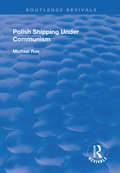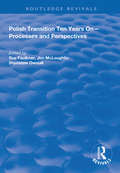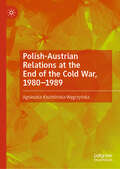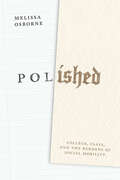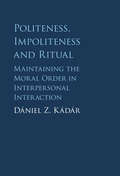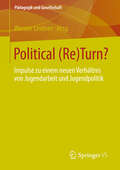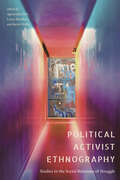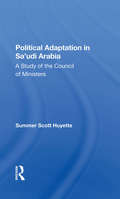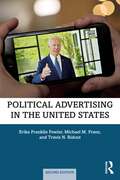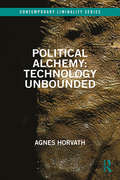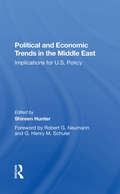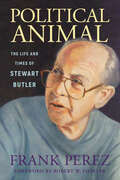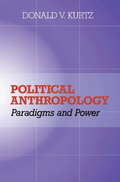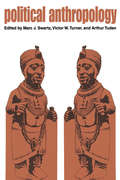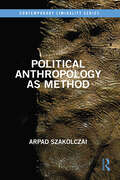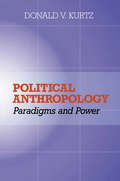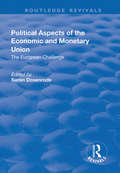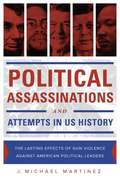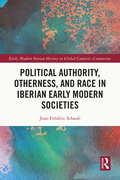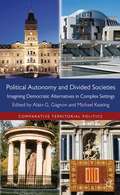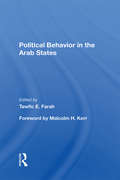- Table View
- List View
Polish Shipping Under Communism (Routledge Revivals)
by Michael RoeThis title was first published in 2001. A look at Polish shipping under communism, arguing that it was one of the great achievements of the Communist years. Michael Roe's point is to examine how the political and economic system of the time combined through an industry achieve aims other than those of a conventional, capitalist economy.
Polish Transition Ten Years On: Processes and Perspectives (Routledge Revivals)
by Stanisław Owsiak Sue Faulkner Jim McLoughlinFirst published in 1999, this volume features articles from specialists in finance on the economic transformation of Poland from a planned approach to a market-based system after the advent of Post-Communist Europe. Despite apparent exemplary progress in the Polish experience, the transitional process has revealed numerous deep, divisive and complex problems. These include rising disparity of incomes, growing unemployment and disillusionment with the early reform process. This book takes the opportunity of being ten years on from the point of transition to reflect upon its effects. It offers a unique dual approach: first a selection of articles on the transition, followed by a case study.
Polish-Austrian Relations at the End of the Cold War, 1980–1989
by Agnieszka Kisztelińska-WęgrzyńskaThis book proposes a new historical framework for the analysis of the relationship between communist Poland and neutral Austria during the final decade of the Cold War. The tragic Polish crisis of 1980–1982 is examined within the context of Poland’s relationship with the wealthy, neutral country of Austria. By exploring the political meetings and negotiations that took place around the introduction of martial law in Poland, this book sheds light on Polish-Austrian bilaterial relations as seen from the perspective of Polish diplomatic documents. Divided into three parts, the book begins by illustrating Austria’s attitude to reforms in Poland in the early 1980s. The second part focuses specifically on the imposition of martial law in Poland, and the third part explores the cooperation between the two countries through the form of investments and environment protection. Particular emphasis is placed on Polish attempts to recruit Austrian politicians in order to overcome the political isolation in which Warsaw found itself after December 13, 1981. The author analyses the political boundaries that Austria could, and wanted to, cross, in order to help the Polish regime, offering insights into Austria’s fears of financial loss as a result of the collapse of the regime.
Polished: College, Class, and the Burdens of Social Mobility
by Melissa OsborneAn illuminating look at the emotional costs of mobility faced by first-generation and low-income college students. While college initiates a major transition in all students’ lives, low-income and first-generation students attending elite schools are often entering entirely new worlds. Amid the financial and academic challenges of adapting to college, their emotional lives, too, undergo a transformation. Surrounded by peers from different classes and cultural backgrounds, they are faced with an impossible choice: turn away from their former lives to blend in or stay true to themselves and remain on the outside. An ethnography that draws on in-depth interviews with one hundred and fifty first-generation and low-income students across eighteen elite institutions, Polished uncovers the hidden consequences of the promise of social mobility in today’s educational landscape. Sociologist Melissa Osborne reveals how the very support designed to propel first-generation students forward can unexpectedly reshape their identities, often putting them at odds with their peers and families. Without direct institutional support, this emotional journey can lead to alienation, mental health challenges, poor academic outcomes, and difficult choices between upward mobility or maintaining authenticity and community. Whether you're an educator, advocate, or student, Polished provides a powerful perspective on the uncharted challenges of social mobility and personal identity during college.
Politeness, Impoliteness and Ritual Maintaining the Moral Order in Interpersonal Interaction.
by Dániel Z. KádárRitual is popularly associated with ceremonies, though in real life it plays a significantly more important role, reinforcing what people perceive as the appropriate moral order of things, or challenging what they perceive as the inappropriate flow of events. This book introduces the reader to how people use ritual in interpersonal interaction and the interface that exists between ritual and politeness and impoliteness. As rituals have a large impact on the life of people and communities, the way in which they use politeness and impoliteness in a ritual action significantly influences the way in which the given ritual is perceived. Politeness, Impoliteness and Ritual examines this complex relationship by setting up a multi-layered analytic model, with a multidisciplinary approach which will appeal to interaction scholars, politeness researchers, social psychologists and anthropologists, and moral psychologists. It fills an important knowledge gap and provides the first (im)politeness-focused interactional model of ritual. Provides a model that can be used to analyse a wide variety of data types Provides a multidisciplinary approach to (im)politeness and ritual, by utilising politeness research, pragmatics, cross-cultural and historical interaction research, and social psychology Provides an in-depth framework of social aggression, including phenomena that generate public attention such as bystander intervention Utilises both metapragmatic and discourse analytic research
Political (Re)Turn?
by Werner LindnerDas Arbeitsfeld der Kinder- und Jugendarbeit steht seit einigen Jahren unter erheblichem Finanz- und Legitimationsdruck, der nicht allein internen Ursachen, sondern wesentlich auch jugendpolitischen Unzulänglichkeiten geschuldet ist. Der Band analysiert das Verhältnis von Jugendarbeit und Jugendpolitik und entwirft perspektivische Strategien für eine zukünftige Positionierung.
Political Activist Ethnography: Studies in the Social Relations of Struggle
by Kevin Walby Agnieszka Doll Laura BisaillonAs activists strategize, build resistance, and foster solidarity, they also call for better dialogue between researchers and movements and for research that can aid their causes. In this volume, contributors examine how research can produce knowledge for social transformation by using political activist ethnography, a unique social research strategy that uses political confrontation as a resource and focuses on moments and spaces of direct struggle to reveal how ruling regimes are organized so activists and social movements can fight them. Featuring research from Aotearoa (New Zealand), Bangladesh, Canada, Poland, South Africa, and the United States on matters as diverse as anti-poverty organizing, prisoners' re-entry, anti-fracking campaigns, left-inspired think-tank development, non-governmental partnerships, involuntary psychiatric admission, and perils of immigration medical examination, contributors to this volume adopt a “bottom-up” approach to inquiry to produce knowledge for activists, not about them. A must-read for humanities and social sciences scholars keen on assisting activists and advancing social change.
Political Adaptation In Sa'udi Arabia: A Study Of The Council Of Ministers
by Summer S HuyetteExamining the evolution of the Sa'udi government from 1901 to 1983, a period of major social and political transformation, Dr, Huyette looks at the ways in which a traditional elite, the Al Sa'ud, has managed to surmount the formidable obstacles of tribal and regional differences compounded by rapid modernization. The Council of Ministers, formed in 1953, is one method developed by the Sa'udis to cope with these problems and represented the first step toward a national administrative system. Dr. Huyette traces the Council's antecedents as well as the changes in its membership, procedures, and responsibilities and the concomitant changes in the political elite and its style of leadership.
Political Advertising in the United States
by Michael M. Franz Travis N. Ridout Erika Franklin FowlerPolitical Advertising in the United States examines the volume, distribution, content, and effects of political advertising in congressional and presidential elections. The book considers the role of television ads using extensive data on ad airings on local broadcast stations. It also analyzes newly available data on paid digital ads, including ads on Facebook, Instagram, Google, and YouTube. The book covers the role of outside groups in airing ads, including the rise of dark money groups and gaps in existing federal campaign finance laws around transparency of outside group spending. The authors consider how ad sponsors design and target ads. They also review the positive and negative implications of an electoral system where billions are spent on paid advertising. With detailed analysis of presidential and congressional campaign ads and discussion questions in each chapter, this accessibly written book is a must-read for students, scholars, and practitioners who want to understand the ins and outs of political advertising. New to the Second Edition • Covers the spending, content, and tone of political advertising in the 2016 and 2020 presidential elections and the 2018 midterms, looking ahead to 2022 and 2024. • Addresses the interference of foreign actors in elections and their connection to political advertising. • Expands the discussion of digital political advertising and incorporates this topic into every chapter. • Adds a new chapter specifically addressing digital ad content and spending. • Includes data from the Facebook, Google, and Snapchat ad libraries and explores the role of these companies in regulating the sale of political advertising. • Incorporates new data on the effects of race and gender in advertising, including what is known about the way in which advertising may activate prejudicial attitudes.
Political Alchemy: Technology Unbounded (Contemporary Liminality)
by Agnes HorvathThis book explores politics as a form of alchemy, understood as the transformation of entities through an alteration of their identities. Identifying this process as a common denominator of many political phenomena, such as EU integration, mediatisation, communism or globalisation, the author demonstrates not only the widespread presence of alchemical techniques in politics, but also the acceleration of their deployment. A study of the steady growth of power as it reaches a continuous and permanent stage, thus avoiding the inherent difficulties connected with birth and death of political organisations and institutions, this volume reveals political alchemy to be a form of self-sustaining growth through sterile multiplication, devoid of meaning. Revealing both the integrative and disintegrative nature of a political process that, while appearing to work in the interests of all, in fact produces apathy, desperate mobilisation and despair by crushing concrete entities such as personality and tradition, Political Alchemy: Technology Unbounded will appeal to scholars of sociology and anthropology with interests in social theory and political thought.
Political And Economic Trends In The Middle East: Implications For U.S. Policy
by Nancy Eddy Shireen Hunter Heidi ShinnThis book explores the rapid changes in the economics and politics of the Middle East, which profoundly influence U.S. policy and interests in the region. The contributors examine elements in the economic picture, including falling oil prices and the uncertainty surrounding OPEC; the concomitant drop in oil revenues and its effect on the spending p
Political Animal: The Life and Times of Stewart Butler (Willie Morris Books in Memoir and Biography)
by Frank PerezDuring Mardi Gras 1973, Stewart Butler (1930–2020) fell in love with Alfred Doolittle—a wealthy socialite and schizophrenic from San Francisco. Their relationship was an improbable love story that changed the course of LGBTQ+ history. With Doolittle’s money, Butler was able to retire and devote his life to political activism in the cause of queer liberation. A survivor of the horrific Up Stairs Lounge arson, Butler was a founding member of the first statewide lesbian and gay rights organization in Louisiana and an early champion for transgender rights, playing a key role in the eight-year struggle to persuade PFLAG to become the first national LGBTQ+ organization to include trans people in its mission statement. In Political Animal: The Life and Times of Stewart Butler, author Frank Perez traces Butler’s amazing life from his early childhood in Depression-era New Orleans, his adolescence at Carville where his father worked, his first unsuccessful attempt at college, his time in the army as a closeted gay man, his adventures in Alaska, his transformation into a hippie in the 1960s, his love affair with Doolittle, his decades as a gay rights advocate, and ultimately, his twilight years as an elder statesman. Based on Butler's own personal papers, including hundreds of letters, and dozens of interviews, Political Animal paints an intimate portrait of a legendary figure in gay politics and the times in which he lived.
Political Anthropology
by Donald V KurtzConvinced that political anthropology is fundamentally about the ideas, theories, and concepts that direct research on political phenomena, Kurtz (anthropology, U. of Wisconsin-Milwaukee) introduces the field by emphasizing theory over data rather than the more traditional reverse approach. He covers paradigms and science, political essentials, and paradigms and specific research topics. Annotation c. Book News, Inc. , Portland, OR (booknews. com)
Political Anthropology
by Donald V KurtzPolitics is all about power, and power--its composition, creation, and use--pervades this unique and clearly written assessment of the paradigms by which anthropologists explain and understand political phenomena. In Political Anthropology, Donald V. Kurtz examines how anthropologists think about politics, political organizations, and problems fundamental to political anthropology. He explores the ideas by which they address universal political concerns, the paradigms that direct political research by anthropologists, and political topics of special interest.The universal political concerns include ideas related to political power, leadership, the legitimation of authority, and rules that regulate succession to political statuses and offices. Kurtz relates these concerns to the paradigms that provide the research strategies anthropologists use to examine political phenomena; he investigates structural functionalism, processualism, political economy, and political evolution. Postmodernism provides a fifth research strategy characterized by an eclectic approach to politics that suggests its paradigmatic status is still unformulated. The analysis concludes with a consideration of ideas related to state formations.
Political Anthropology
by Donald V KurtzPolitics is all about power, and power--its composition, creation, and use--pervades this unique and clearly written assessment of the paradigms by which anthropologists explain and understand political phenomena. In Political Anthropology, Donald V. Kurtz examines how anthropologists think about politics, political organizations, and problems fundamental to political anthropology. He explores the ideas by which they address universal political concerns, the paradigms that direct political research by anthropologists, and political topics of special interest. The universal political concerns include ideas related to political power, leadership, the legitimation of authority, and rules that regulate succession to political statuses and offices. Kurtz relates these concerns to the paradigms that provide the research strategies anthropologists use to examine political phenomena; he investigates structural functionalism, processualism, political economy, and political evolution. Postmodernism provides a fifth research strategy characterized by an eclectic approach to politics that suggests its paradigmatic status is still unformulated. The analysis concludes with a consideration of ideas related to state formations.
Political Anthropology
by Donald V KurtzPolitics is all about power, and power--its composition, creation, and use--pervades this unique and clearly written assessment of the paradigms by which anthropologists explain and understand political phenomena. In Political Anthropology, Donald V. Kurtz examines how anthropologists think about politics, political organizations, and problems fundamental to political anthropology. He explores the ideas by which they address universal political concerns, the paradigms that direct political research by anthropologists, and political topics of special interest.The universal political concerns include ideas related to political power, leadership, the legitimation of authority, and rules that regulate succession to political statuses and offices. Kurtz relates these concerns to the paradigms that provide the research strategies anthropologists use to examine political phenomena; he investigates structural functionalism, processualism, political economy, and political evolution. Postmodernism provides a fifth research strategy characterized by an eclectic approach to politics that suggests its paradigmatic status is still unformulated. The analysis concludes with a consideration of ideas related to state formations.
Political Anthropology
by Victor W. TurnerPolitics: a static network of structural and functional models? Is it a "given" set of rules, statuses and procedures? Or a dynamic process, a continuum related to the past as well as to the present and continually influenced by pressures within and outside of a society? Taking the latter view of the nature of political behavior, the editors of Political Anthropology here present an original compilation of papers that thoroughly assess contemporary anthropological research and theory on political phenomena and explore the sources and maintenance of political power. One of the aims of this book is to take tentative steps toward resolving the developing crisis by investigating the structure of political action revealed in empirical data. Within the general framework of political dynamics the book uses processes such as decision making, the judicial process, the disturbance and settlement of policy issues, the application of sanctions, and the outcome of disputes among other things. These items will find their places as components of phases in the major sequence. Investigating societies from Africa to Alaska, politics is shown to be a global phenomenon--a "human process of action" centering on the conflict between the "common good" and "interests of groups," and on the resolution or extension of that conflict by the religious, structural, sociocultural, and psychological pressures within and external to a social grouping. Essential reading for anyone concerned with the nature of political process, Political Anthropology presents a fresh, important and comprehensive overview of the "wind of change" currently abroad in the study of political behavior.
Political Anthropology as Method (Contemporary Liminality)
by Arpad SzakolczaiThis book explores considerations of method in the field of political anthropology, contending that this constitutes a distinct approach within the broader area of the human, social and political sciences. Faithful to the basic guiding ideas of anthropology, it nonetheless challenges and rejects the pretended stance of scientific neutrality and advances a position that engages with the notion of participation, recognising its value and arguing that participation is essential to the development of a proper social and political understanding. An outline of what political anthropology can offer by way of methods, this invitation to consider the development of methodological ideas beyond the presumed ‘scientific’ and ‘universalistic’ approaches that dominate in the social sciences will appeal to scholars of anthropology, sociology and politics with interests in questions of method and methodology.
Political Anthropology: Power And Paradigms (Studies In Human Society Ser. #9)
by Donald V KurtzAn examination of the ideas that constitute the research paradigms and selected topics by which anthropologists explain and understand power, politics, political organizations, and political topics across ethnographic and historical space and time.. The field of political anthropology is complicated by a breadth and depth of interests that include every kind of ethnographically and historically represented political community, and nearly every kind of recorded political practice, behavior, and organization. To make sense of this array of information, political anthropologists examine political topics and issues in the context of research paradigms that include structural-functionalism, processualism, political economy, political evolution, and, arguably, postmodernism. In this book, Donald V. Kurtz examines how the ideas of political anthropologies concerned with political power, leadership, legitimation, succession, and state formations relate to research strategies that are directed by these paradigms. }Politics is all about power, and power--its composition, creation, and use--pervades this unique and clearly written assessment of the paradigms by which anthropologists explain and understand political phenomena. In Political Anthropology , Donald V. Kurtz examines how anthropologists think about politics, political organizations, and problems fundamental to political anthropology. He explores the ideas by which they address universal political concerns, the paradigms that direct political research by anthropologists, and political topics of special interest.The universal political concerns include ideas related to political power, leadership, the legitimation of authority, and rules that regulate succession to political statuses and offices. Kurtz relates these concerns to the paradigms that provide the research strategies anthropologusts use to examine political phenomena; he investigates structural functionalism, processualism, political economy, and political evolution. Postmodernism provides a fifth research strategy characterized by an eclectic approach to politics that suggests its paradigmatic status is still unformulated. The analysis concludes with a consideration of idea related to state formations. }
Political Aspects of Social Indicators: Implications for Research (Social Science Frontiers #Vol. 4)
by Peter J. HenriotComplementing the focus on the structural and social-psychological aspects of measuring social change, this report establishes a research approach relating social measurement to antecedent and consequent political considerations: political values, policy impact, power consequences, administrative influences, institutionalization, and so forth. This study is directed to any social scientist interested in political phenomena and in the issue of the relationship between social science and public policy.
Political Aspects of the Economic Monetary Union (Routledge Revivals)
by Soren Zibrandt von Dosenrode-LyngeThis title was first published in 2002: Concentrating on the myriad political aspects of European Monetary Union (EMU), this volume places the EMU and the European Union (EU) in a global context. It should be useful for scholars and students of European studies, economics, modern history and international relations. Libraries and embassies should also find it a valuable reference tool.
Political Assassinations and Attempts in US History: The Lasting Effects of Gun Violence Against American Political Leaders
by J. Michael MartinezThe long, dark history of political violence in the United States Violence has been employed to achieve political objectives throughout history. Taking the life of a perceived enemy is as old as mankind. Antiquity is filled with examples of political murders, such as when Julius Caesar was felled by assassins in 44 BCE. While assassinations and assassination attempts are not unique to the American way of life, denizens of other nations sometimes look upon the US as populated by reckless cowboys owing to a “Wild West” attitude about violence, especially episodes involving guns. In this book, J. Michael Martinez focuses on assassinations and attempts in the American republic. Nine American presidents—Andrew Jackson, Abraham Lincoln, James A. Garfield, William McKinley, Harry S. Truman, John F. Kennedy, Richard Nixon, Gerald Ford, and Ronald Reagan—have been the targets of assassins. President-elect Franklin D. Roosevelt was also a target shortly before he was sworn into office in 1933. Moreover, three presidential candidates—Theodore Roosevelt, Robert F. Kennedy, and George Wallace—were shot by assailants. In addition to presidents and candidates for the presidency, eight governors, seven U.S. senators, nine U.S. House members, eleven mayors, seventeen state legislators, and eleven judges have been victims of political violence. Not all political assassinations involve elected officials. Some of those targeted, such as Joseph Smith, Malcolm X, and Martin Luther King Jr., were public figures who influenced political issues. But their cases are instructive because of their connection to, and influence on, the political process. No other nation with a population of over 50 million people has witnessed as many political assassinations or attempts. These violent episodes trigger a series of important questions. First, why has the United States—a country constructed on a bedrock of the rule of law and firmly committed to due process—been so susceptible to political violence? Martinez addresses these questions as he examines twenty-five instances of violence against elected officials and public figures in American history.
Political Authority, Otherness, and Race in Iberian Early Modern Societies (Early Modern Iberian History in Global Contexts)
by Jean-Frédéric SchaubThis book examines how the Iberian empires of the early-modern period were structured around population control, segregation, and racial policies rather than nation-state characteristics.Covering a variety of topics, Schaub analyzes the idea that the political regimes of the 15th-18th centuries did not have the characteristics of contemporary nation-states. It shows that control over populations, their description and the implementation of segregation played a central role in the structuring of these political systems. The focus is on the two Iberian monarchies in the early-modern period. The reader will find both theoretical propositions of wide relevance and empirical examples as case studies. There are detailed explanations of the political regimes in the 16th and 17th centuries, based on the example of the union of the crowns of Spain and Portugal. The book presents methods of managing the diversity of populations within imperial structures. It shows that the notion of the stain (macula) played an important role in disqualifying individuals and social groups. Finally, it draws on these empirical case studies to offer a general reflection on the history of race and colonization. In short, the book shows that it is impossible to understand the political structures of the ancien régime without giving a central role to the policies of race.Political Authority, Otherness, and Race in Iberian Early Modern Societies will be of value to students and researchers who wish to gain a better understanding of the empires of the early-modern period.
Political Autonomy and Divided Societies
by Michael Keating Alain-G. GagnonAn all star cast of academic experts offer an important and timely analysis of the pursuit of autonomy. They argue that it is key to move beyond the primarily normative debate about the rights or wrongs of autonomous regions on the basis of cultural concerns, instead focusing on understanding what makes autonomy function successfully.
Political Behavior In The Arab States
by Tawfic E FarahThis vivid portrayal of political and social behavior in the Arab states offers new perspectives to the student and scholar of the Middle East. It also illustrates the effectiveness of survey research as an analytical tool for investigating political, social, and economic problems in Arab societies. The only book of its kind—dealing in a comprehensive and interdisciplinary fashion with the political and social behavior of individuals in the Arab world—it fills a gap in the materials available for courses on the Middle East.
